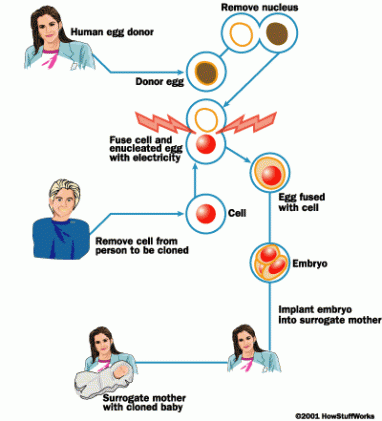The Ethics Of Human Cloning
The Three Types of Cloning
Therapeutic
Therapeutic cloning is the manufacturing of human embryos for the use of research. This type of cloning is not used to create cloned human beings, but to harvest stem cells that can be used to study human advancement and to treat disease. Some people support therapeutic cloning to create embryonic stem cells for research and medicine.
For more on therapeutic cloning, try visiting
http://websites.afar.org/site/PageServer?pagename=IA_b_cloning_3_therapeutic
For more on therapeutic cloning, try visiting
http://websites.afar.org/site/PageServer?pagename=IA_b_cloning_3_therapeutic
Reproductive
Reproductive cloning is when an organism is "created" that has the same nuclear DNA as another existing or previously existing animal. In reproductive cloning, scientists transplant genetic material from the nucleus of a donor adult cell to an egg whose nucleus, containing genetic material, has been removed. Once the cloned embryo reaches a certain stage, it is implanted into the uterus of a female, where it continues to grow until birth. Supporters of reproductive cloning see it as a possible solution to infertility problems, despite the risks.
For more on reproductive cloning, try visiting
http://www.geneticsandsociety.org/section.php?id=16
For more on reproductive cloning, try visiting
http://www.geneticsandsociety.org/section.php?id=16
DNA
In DNA cloning, a DNA particle is transferred from one organism to a self-replicating genetic element, for example, bacterial plasmid. The DNA can then grow in a foreign host cell.
For more on DNA cloning, try visiting
http://www.wisegeek.com/what-is-dna-cloning.htm
For more on DNA cloning, try visiting
http://www.wisegeek.com/what-is-dna-cloning.htm

